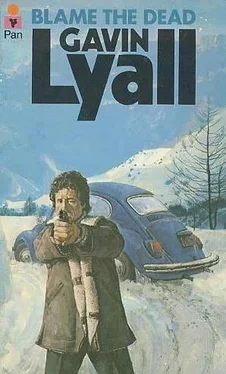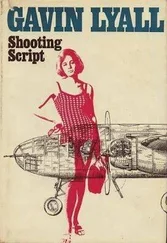Gavin Lyall - Blame The Dead
Здесь есть возможность читать онлайн «Gavin Lyall - Blame The Dead» весь текст электронной книги совершенно бесплатно (целиком полную версию без сокращений). В некоторых случаях можно слушать аудио, скачать через торрент в формате fb2 и присутствует краткое содержание. Жанр: Триллер, на английском языке. Описание произведения, (предисловие) а так же отзывы посетителей доступны на портале библиотеки ЛибКат.
- Название:Blame The Dead
- Автор:
- Жанр:
- Год:неизвестен
- ISBN:нет данных
- Рейтинг книги:4 / 5. Голосов: 1
-
Избранное:Добавить в избранное
- Отзывы:
-
Ваша оценка:
- 80
- 1
- 2
- 3
- 4
- 5
Blame The Dead: краткое содержание, описание и аннотация
Предлагаем к чтению аннотацию, описание, краткое содержание или предисловие (зависит от того, что написал сам автор книги «Blame The Dead»). Если вы не нашли необходимую информацию о книге — напишите в комментариях, мы постараемся отыскать её.
Blame The Dead — читать онлайн бесплатно полную книгу (весь текст) целиком
Ниже представлен текст книги, разбитый по страницам. Система сохранения места последней прочитанной страницы, позволяет с удобством читать онлайн бесплатно книгу «Blame The Dead», без необходимости каждый раз заново искать на чём Вы остановились. Поставьте закладку, и сможете в любой момент перейти на страницу, на которой закончили чтение.
Интервал:
Закладка:
'Just rather.'
She smiled suddenly. 'Now I'll bet I've said the wrong thing: were you at Harrow?'
'Like hell I was. I was at grammar school in Glasgow during the war; then we moved down to Worcester. Nowhere anybody heard of.'
There was a knock on the door and Mrs Benson waddled in. 'If you've finished, madam, I'll clear up and then be off.' And I got a look that suggested I was badly overdue, as well.
Mrs Fenwick answered in a slightly nervous sing-song voice. 'Thank you very much, Mrs Benson. We'll go through.' She led the way back across the hall.
When the door was closed, I said, 'Mrs Fenwick – I mean Lois – could I ask if you're going to let me search this house?'
She made an elegant little shivery movement. 'How very blunt. Well, of course you can. I'm going into the village to do some shopping, so you'll be all alone for at least an hour.'
'Fine,' I said. She lit a cigarette and leaned gracefully on the end of the mantelpiece, and smiled at me. I said, 'Fine,' again, but still wondered why it was that easy.
Mrs Benson and the old Morris Minor had gone by the time I went out to see Mrs Fenwick off. I helped her drag open the rather rickety doors of the wooden two-car garage – and hadn't expected to feel the gut punch like a suddenly remembered shame. Just at the sight of a car.
She noticed. 'The AA brought it home on Wednesday.'
'Yes.' I went on staring at it. They hadn't even cleaned it -why should they? It still had the stains of Calais and Arras and Lille, and his fingerprints and mine…
She said, 'The other one's mine. Little Trotsky.'
The other one was a red Morgan Plus 4, the last of the handmade small sports cars, built with deliberately old-fashioned lines: cutaway doors, running-board, spare wheel out in the open and all.
'Trotsky?' I asked, coming out of my daze.
'He's red and a bit wild but with great integrity.'
'And he hasn't been to Mexico yet.'
She laughed, a cheery silver-bells sound. 'What a lovely idea. When he's on his last legs, I'll maybe take him over there to die.' She slipped a ready-knotted silk headscarf over her hair, climbed in, and started up.
I stood aside as she backed out. She swung neatly around, called, 'It's all yours,' then waved and roared off around the house. I swung the doors closed and walked slowly back up the steps.
For a time I stood inside the front door and did the old trick of trying to feel the house that sat around me. It didn't help, of course, because it wasn'this house. But in another way, that might make things easier; if he'd been just the Occupying Power it limited the places he'd think of hiding something. So, just to start with, I fell back on the standard rules and began looking.
A man doesn't hide something in a kitchen; not his territory. Nor, for much the same reason, in a dining-room. Nor in a bedroom, even if he has his own one, as Fenwick had there. It doesn't feel private to a man, the way it does to a woman. Just look at the suicide statistics; women usually kill themselves in bedrooms, men almost never.
That cut out a fair bit of territory, and I could add David's room and probably a few larders and cloakrooms and coal-houses where Mrs Benson had the grazing rights. Which didn't leave us much positive information except that men hide things high rather than low, unless they're young or short-arsed, and Fenwick had been neither.
All those rules are taught in the best CI schools and are both beautiful and true, but they miss out one thing: there has to be something there to be found. And here, there wasn't. After nearly two hours, I was absolutely damn certain of that. It wasn't in the cellar and it wasn't in the attic and it wasn't anywhere in between. It wasn't in the gardening shed and it wasn't in the garage.
Of course, it might be locked in a treasure chest and buried anywhere in the acre or so of ground – but that didn't make sense. Fenwick hadn't been laying it down for the future like port or savings bonds. This was a live piece of evidence; if he'd bothered to hide it at all, it had to be somewhere simple, where he could get it back quickly.
Like his bank or his solicitors' office?
I drifted gloomily back to Fenwick's study and sat down at his desk and helped myself to a mouthful of Norwegian aquavit from a bottle in the corner. It was a nice, small, crowded, very masculine room; all tobacco browns and rich dark greens. A couple of comfortable deep leather chairs, rows of Folio Society books, one of those bone galleons that French prisoners on Dartmoor used to carve in Napoleonic times. Or a good fake of one, of course.
A handsome room, although maybe a bit like the Master's Study layout in a furniture exhibition, and a bit wasted, seeing how little time Fenwick can have spent here. Unless somebody else had built it for him, as bait.
Thirty
Lois – I was beginning to think of her by her Christian name, now – got back soon after four. I heard the Morgan grinding across the gravel and went out to open the garage doors for her.
'Any luck?' she asked cheerfully.
I shook my head. She drove past me and parked beside the Rover. I picked some of the food boxes out of the back; there was enough there to feed an army for a campaign.
'David'll be home on Tuesday,' she explained, then looked a little bleak. 'At least I hope so.' She perked up again, and turned to my problem. 'Never mind, I expect it'll turn up. Perhaps he left it at his apartment in town.'
'He didn't.'
She turned quickly. 'How d'you know?'
I shrugged. 'I managed to get in there.'
She looked at me carefully, then smiled. 'I suppose you have to do things like that. And you didn't find anything?'
'Nothing.' We went up into the house, me wondering why she had looked shocked at my turning over the flat when she hadn't even blinked at the idea of me doing it to her own house. But not wondering very hard.
We dumped the boxes in the kitchen and she looked around and said, 'It's very tidy. You don't seem to have moved anything. But I suppose you were trained to leave it like that.'
'Something like it. Well – thank you for letting me try.'
'Must you hurry back to London? Would you like a cup of tea?'
Some silences are louder than a scream, some things unsaid are clearer than a parade-ground order. I hesitated, looking at her and seeing only a gentle, guileless baby-faced smile. But thinking suddenly of her as a woman, not Fenwick's widow or David's mother or a style or an accent… but as small neat breasts that looked sharp and would feel very soft, and pale skin like silk and long, agile legs and a clutching warm welcome…
'Yes,' I said carefully. 'A cup of tea Would be very nice.'
We sat on opposite sides of the big kitchen table and sipped politely.
'What are you thinking?' she asked innocently.
'Oh… about the weather.'
'Of course.' Her smile got a little mischievous. 'Warm, for the time of year, what? '
'Something to do with a region of high pressure.'
'No cold fronts, then.'
'Strictly warm ones. Or occluded, of course.'
'I never understood what an occluded front was.'
'A mixture of warm and cold fronts.'
She nodded. 'How very wicked it does sound.'
'No, that's just the way it looks on the weather map.
'Does somebody have to draw you a map?'
She smiled innocently again.
And the phone rang.
We stared at each other, eyes steady with false calm. Then she slowly got up and went out to the hall to answer it.
I collected the cups and saucers and teapot and jug and sugar and put them away or stacked them neatly. I don't know why. Instinct, from living alone. Or for something to do.
Then I went out to the hall. She was standing with the phone, listening and nodding. She reached out a hand to me and I held it. Her strong slim fingers twined around mine.
Читать дальшеИнтервал:
Закладка:
Похожие книги на «Blame The Dead»
Представляем Вашему вниманию похожие книги на «Blame The Dead» списком для выбора. Мы отобрали схожую по названию и смыслу литературу в надежде предоставить читателям больше вариантов отыскать новые, интересные, ещё непрочитанные произведения.
Обсуждение, отзывы о книге «Blame The Dead» и просто собственные мнения читателей. Оставьте ваши комментарии, напишите, что Вы думаете о произведении, его смысле или главных героях. Укажите что конкретно понравилось, а что нет, и почему Вы так считаете.











